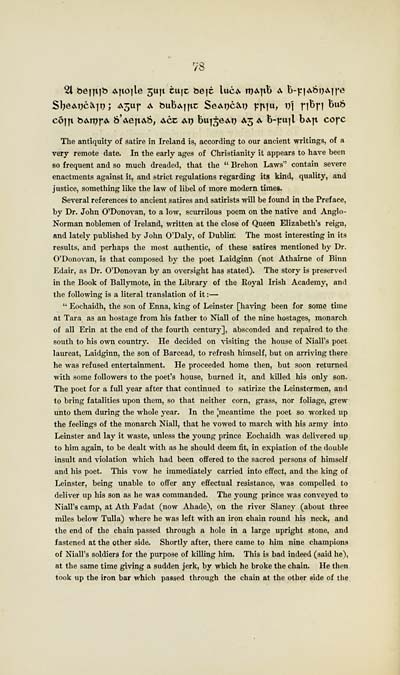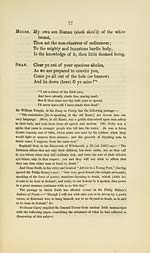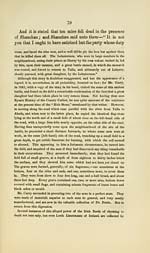Download files
Complete book:
Individual page:
Thumbnail gallery: Grid view | List view

V8
21 &ei]t]b A]to]le 511)1 cuic be|c Iuc<n rt)A|tb A b-p|A6i)Aife
Sbe<M)cS^]r) ; A5Uf a &ubA||tr SeAtjcivt) t^tiiu, ^)'] f]^]'] ^"^
có]|t feAn^fA 6'AetxA&, acc atj bu^jeAT) A5 A b-TíU|l bA|t cofc
The antiquity of satire in Ireland is, according to our ancient writings, of a
very remote date. In the early ages of Christianity it appears to have been
80 frequent and so much dreaded, that the " Brehon Laws" contain severe
enactments against it, and strict regulations regarding its kind, quality, and
justice, something like the law of libel of more modern times.
Several references to ancient satires and satirists will be found in the Preface,
by Dr. John O'Donovan, to a low, scurrilous poem on the native and Anglo-
Norman noblemen of Ireland, written at the close of Queen Elizabeth's reign,
and lately published by John O'Daly, of Dublin. The most interesting in its
results, and perhaps the most authentic, of these satires mentioned by Dr.
O'Donovan, is that composed bj- the poet Laidginn (not Athairne of Binn
Edair, as Dr. O'Donovan by an oversight has stated). The story is preserved
in the Book of Balljnnote, in the Library of the Royal Irish Academy, and
the following is a literal translation of it : —
" Eochaidh, the son of Enna, king of Leinster [having been for some time
at Tara as an hostage from his father to Niall of the nine hostages, monarch
of all Erin at the end of the fourth century], absconded and repaired to the
south to his o^vn country. He decided on visiting the house of Niall's poet
laureat, Laidginn, the son of Barcead, to refresh himself, but on arriving there
he was refused entertainment. He proceeded home then, but soon returned
with some followers to the poet's house, burned it, and killed his only son.
The poet for a full year after that continued to satirize the Leinstermen, and
to bring fatalities upon them, so that neither corn, grass, nor foliage, grew
unto them during the whole year. In the jmeantime the poet so worked up
the feelings of the monarch Niall, that he vowed to march with his army into
Leinster and lay it waste, unless the young prince Eochaidh was delivered up
to him again, to be dealt with as he should deem fit, in expiation of the double
insult and violation which had been offered to the sacred persons of himself
and his poet. This vow he immediately carried into effect, and the king of
Leinster, being unable to offer any effectual resistance, was compelled to
deliver up his son as he was commanded. The young prince was conveyed to
Niall's camp, at Ath Fadat (now Ahade), on the river Slaney (about three
miles below Tulla) where he was left with an iron chain round his neck, and
the end of the chain passed through a hole in a large upright stone, and
fastened at the other side. Shortly after, there came to him nine champions
of Niall's soldiers for the purpose of killing him. This is bad indeed (said he),
at the same time giving a sudden jerk, by which he broke the chain. He tlicn
took up the iron bar which passed through the chain at the other side of the
21 &ei]t]b A]to]le 511)1 cuic be|c Iuc<n rt)A|tb A b-p|A6i)Aife
Sbe<M)cS^]r) ; A5Uf a &ubA||tr SeAtjcivt) t^tiiu, ^)'] f]^]'] ^"^
có]|t feAn^fA 6'AetxA&, acc atj bu^jeAT) A5 A b-TíU|l bA|t cofc
The antiquity of satire in Ireland is, according to our ancient writings, of a
very remote date. In the early ages of Christianity it appears to have been
80 frequent and so much dreaded, that the " Brehon Laws" contain severe
enactments against it, and strict regulations regarding its kind, quality, and
justice, something like the law of libel of more modern times.
Several references to ancient satires and satirists will be found in the Preface,
by Dr. John O'Donovan, to a low, scurrilous poem on the native and Anglo-
Norman noblemen of Ireland, written at the close of Queen Elizabeth's reign,
and lately published by John O'Daly, of Dublin. The most interesting in its
results, and perhaps the most authentic, of these satires mentioned by Dr.
O'Donovan, is that composed bj- the poet Laidginn (not Athairne of Binn
Edair, as Dr. O'Donovan by an oversight has stated). The story is preserved
in the Book of Balljnnote, in the Library of the Royal Irish Academy, and
the following is a literal translation of it : —
" Eochaidh, the son of Enna, king of Leinster [having been for some time
at Tara as an hostage from his father to Niall of the nine hostages, monarch
of all Erin at the end of the fourth century], absconded and repaired to the
south to his o^vn country. He decided on visiting the house of Niall's poet
laureat, Laidginn, the son of Barcead, to refresh himself, but on arriving there
he was refused entertainment. He proceeded home then, but soon returned
with some followers to the poet's house, burned it, and killed his only son.
The poet for a full year after that continued to satirize the Leinstermen, and
to bring fatalities upon them, so that neither corn, grass, nor foliage, grew
unto them during the whole year. In the jmeantime the poet so worked up
the feelings of the monarch Niall, that he vowed to march with his army into
Leinster and lay it waste, unless the young prince Eochaidh was delivered up
to him again, to be dealt with as he should deem fit, in expiation of the double
insult and violation which had been offered to the sacred persons of himself
and his poet. This vow he immediately carried into effect, and the king of
Leinster, being unable to offer any effectual resistance, was compelled to
deliver up his son as he was commanded. The young prince was conveyed to
Niall's camp, at Ath Fadat (now Ahade), on the river Slaney (about three
miles below Tulla) where he was left with an iron chain round his neck, and
the end of the chain passed through a hole in a large upright stone, and
fastened at the other side. Shortly after, there came to him nine champions
of Niall's soldiers for the purpose of killing him. This is bad indeed (said he),
at the same time giving a sudden jerk, by which he broke the chain. He tlicn
took up the iron bar which passed through the chain at the other side of the
Set display mode to: Large image | Transcription
Images and transcriptions on this page, including medium image downloads, may be used under the Creative Commons Attribution 4.0 International Licence unless otherwise stated. ![]()
| Early Gaelic Book Collections > J. F. Campbell Collection > Transactions of the Ossianic Society > Volume 5 > (118) |
|---|
| Permanent URL | https://digital.nls.uk/82283225 |
|---|
| Description | Dublin : Printed under the direction of the Council, 1854-1861. |
|---|---|
| Shelfmark | Cam.1.c.5-10 |
| Additional NLS resources: | |
| Description | Volumes from a collection of 610 books rich in Highland folklore, Ossianic literature and other Celtic subjects. Many of the books annotated by John Francis Campbell of Islay, who assembled the collection. |
|---|
| Description | Selected items from five 'Special and Named Printed Collections'. Includes books in Gaelic and other Celtic languages, works about the Gaels, their languages, literature, culture and history. |
|---|

